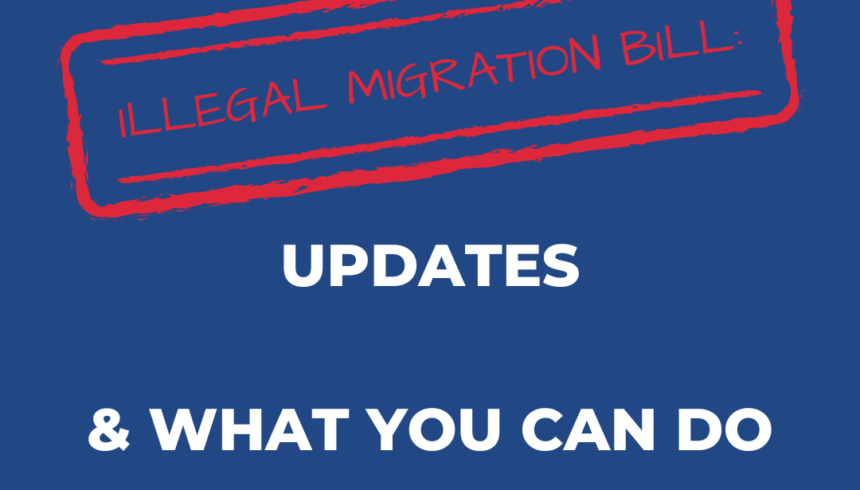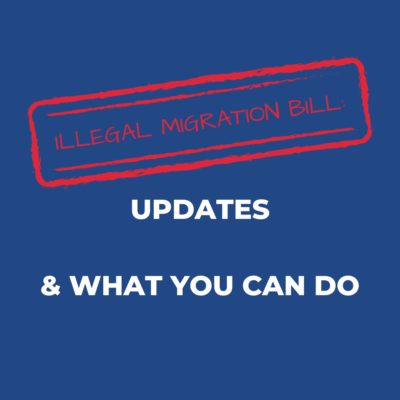Sophie Cartwright, JRS Senior Policy Officer, writes with an update on the Illegal Migration Bill and what you can do stand in solidarity with refugees, and call on the Refugee Ban Bill to be struck down.
The Illegal Migration Bill, which would all but extinguish the right to claim asylum in the UK, has now completed report stage in the House of Lords, and is about to return to the Commons next week. The government has been defeated in the Lords on a number of fronts, meaning that the Bill going back to the Commons looks very different from the one that left it. There is a very great danger that the government, will simply reject the changes made.
The Bill is due to have its third reading in the House of Lords on Monday 10th July, and head straight back to the House of Commons on Tuesday 11th July.
This speedy timetable is unprecedented – there is normally a gap between the Lords and return to the Commons, allowing the Commons to consider amendments carefully and give clear reasons where they don’t accept them.
This lack of scrutiny isn’t what we’d have wanted – but there is still time to influence the outcome.
Some of the key changes we want to be kept
Asylum ban lifted for those who cannot be removed
The Bill seeks to make all claims for asylum ‘inadmissible’, and would give a statutory duty to immediately remove people seeking sanctuary from the country. This is possibly one of the most impractical – and deeply cruel – notions of the whole Bill as in reality it is complex to remove and deport people from the country.
In reality, we would see people in need of international protection subjected to years of limbo, unremovable but with no way to resolve their status, vulnerable to exploitation and either entirely destitute or being variously incarcerated and accommodated in quasi-detention
One Lords amendment states that the government must consider the asylum claims of people deemed inadmissible if they have not been removed after 6 months. There would then be no statutory duty to remove these people.
This amendment isn’t perfect, at it doesn’t preserve a system of providing protection to those who need it (as the government would still initially refuse most asylum claims, and spend 6 months trying to remove those seeking sanctuary) – but it outs a statutory timeline and duty on how people seeking sanctuary should be treated.
Protecting pregnant women from detention
The Bill has no statutory limits or protections for the detention of pregnant women, meaning they would be detained without a time limit and our experience tells us for prolonged periods, with little or no access to healthcare.
Another amendment preserves existing limits on the detention of pregnant women – protecting them from the long-term harms of detention.
Protecting children from detention
The Bill puts in no statutory limits or protections from the detention of children.
TA collection of amendments retain existing limits on the detention of children. The Lords introduced amendments protecting both unaccompanied children and those travelling with families – many of whom will be young infants.
Though much of the focus has been on unaccompanied children, it is vital that all children are protected from the lifelong trauma that detention inflicts.
Complying with international frameworks designed to protect human persons
Much of the Bill contradicts and undermines international law, the Refugee Convention.
The Lords have passed an amendment stating that nothing in the Bill can be read to contradict key parts of international law specifically:
- The UN Refugee Convention
- The UN Conventions on the Reduction of Statelessness
- the European Convention for the Protection of Human Rights and Fundamental Freedoms;
- The UN Convention on the Rights of the Child
- the 2005 Council of Europe Convention on Action against Trafficking Human Beings (ECAT)
These are all agreements the UK has committed to, and they are all designed primarily to protect human persons, especially in contexts where they are likely to be vulnerable. This amendment also took out an opening clause that would mean everything in the Bill has to be read to effect removal from the UK.
Keeping this amendment in the Bill is important to allow other positive amendments to work.
Unaccompanied children exempt from asylum ban
The Bill blocks everyone from claiming asylum – including children.
A further amendment stipulates that the government still consider asylum claims from unaccompanied children.
Protecting survivors of modern slavery and trafficking
The Bill strips aways protections for victims and survivors of modern slavery and human trafficking – in direct opposition to the Modern Slavery Act.
A collection of amendments aim, in different ways, to preserve essential protections for victims and survivors of human trafficking and modern slavery.
Protecting LGBT refugees
The Bill’s proposals for widespread forced removal do not take account of the particular dangers faced by LGBT people.
Another amendment stipulates countries to which LGBT people cannot be forcibly removed, reflecting the great and particular danger they would face.
No retrospective application
The Bill – incredibly unusually – contains a clause allowing the laws to apply retrospectively to people who have arrived from 7th March 2023.
One Lords amendment states that the Bill, if passed, wouldn’t.
Even with all these changes, the Bill would still create massive human misery and represent an unprecedented attack on refugee rights. And there is every danger of MPs rejecting the changes. Write to your MP now to:
- Ask them to Oppose this Bill – it is cruel and unworkable!
- Ask them to support these positive amendments from the Lords.
We want to stick with the Refugee Convention; we don’t want to incarcerate children or pregnant women; we want to protect LGBT people and survivors of modern slavery; and we don’t want people trapped in limbo indefinitely when the government’s cruel and unworkable plan to remove them goes predictably wrong.
Some minor changes to how amendments are referred to were made on 11th July. This was done to clear up any confusion, as amendents numbers can change during the parliamentary process.



